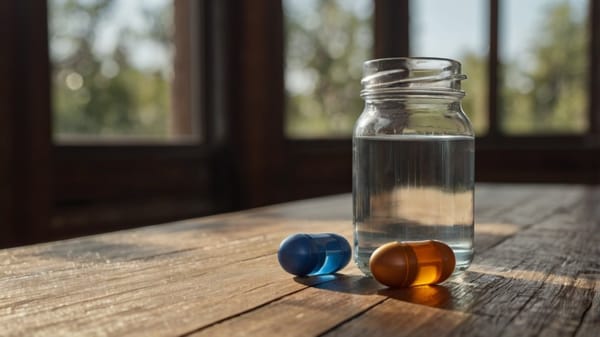Sore All the Time? These Supplements Help You Bounce Back
Always sore, even after rest? These daily supplements support faster recovery, ease inflammation, and help you feel ready to move again.

Why do some people bounce back after a tough workout while others feel wrecked for days? If you’re constantly sore—even when you're not pushing that hard—your body may be running low on what it needs to repair.
Stretching and sleep help, but they’re not always enough. The real shift happens when you support the full recovery cycle. That’s where a few smart, daily supplements can make all the difference.
Why You’re Sore More Than You Should Be
Let’s get something straight—occasional soreness is normal. It’s your body responding to effort, growth, and change.
But when soreness sticks around longer than it should—or shows up even when you haven’t trained hard—there’s a deeper issue.
Your body is trying to recover, but something’s slowing it down. That could be:
- Low-grade inflammation
- Poor muscle repair signals
- Incomplete nutrient replenishment
- Stress hormones that keep your nervous system stuck in “fight or flight”
Even mild stress, sleep issues, or nutrient gaps can interfere with muscle healing and energy production. And when that happens, you’re not just tired—you’re sore, stiff, and sluggish.
What Good Recovery Actually Looks Like
Good recovery isn’t just “not being sore.” It means waking up with more energy. Moving through your day without tightness. Feeling like you could train again—because your body feels ready.
And to get there, your recovery stack needs to hit a few key areas:
- Reduce internal inflammation
- Rebuild soft tissue and muscle fibers
- Replenish what was lost (minerals, aminos, fluids)
- Regulate the stress response so your body can heal
The right supplements don’t override your body—they support the recovery pathways already in motion. Think of them as recovery accelerators, not crutches.

Magnesium: The Muscle Whisperer
Magnesium is one of the most underrated recovery tools. Your muscles contract with calcium—but they relax with magnesium. Without enough of it, you stay tight. Stiff. Prone to cramps or random twitches.
It’s also involved in over 300 enzymatic processes—including ATP production (aka energy for muscle repair).
Magnesium glycinate or magnesium malate are great options if you want full-body relaxation without making you feel groggy. Take it before bed and you'll likely notice fewer nighttime wake-ups, smoother mornings, and less tension overall.
Collagen + Vitamin C: Build Back Better
You don’t just need protein to rebuild muscle—you need the right kind. Collagen helps rebuild connective tissues like tendons, ligaments, and fascia. These structures often take a hit when you're sore, even if you don’t feel it right away.
The key is pairing collagen with Vitamin C, which acts as a co-factor in collagen synthesis. Without it, your body can’t activate or properly use the collagen you’re taking.
Taken daily, this combo can strengthen joints, improve skin elasticity, and speed up healing from microtears you don’t even notice until days later.
Tart Cherry Extract: Smooth the Recovery Curve
Tart cherry extract is one of the few natural supplements that consistently shows up in recovery studies—and for good reason.
It's rich in anthocyanins, which help reduce delayed onset muscle soreness (DOMS) and support deeper sleep, both essential for full recovery.
What makes it stand out? It addresses both physical and neurological inflammation. That means it helps reduce the pain you feel and the stress that amplifies it.
It’s especially effective when taken after intense workouts or at night. You may not notice a dramatic change overnight, but give it a few consistent days and you’ll feel a smoother rebound.
Creatine: More Than Muscle
Creatine gets boxed into the "bulking" category way too often. But its real power lies in cellular energy production. When your muscles are damaged or depleted, they need ATP to repair—and creatine helps you make more of it, faster.
It also improves hydration inside the muscle, which supports protein synthesis and nutrient delivery.
Take it daily, even on rest days. It’s not a stimulant, and you don’t need a loading phase. You’ll notice not just better strength, but quicker muscle recovery and less soreness between sessions.
Omega-3s: Your Joint’s Best Friend
Fish oil isn’t just for brain health. Omega-3 fatty acids (especially EPA and DHA) support joint lubrication, reduce systemic inflammation, and can help shorten recovery time between training sessions.
If your soreness feels more like joint stiffness or lingering aches—especially in your knees, shoulders, or hips—this is your sign. Omega-3s help reduce the wear-and-tear effect and improve overall tissue flexibility.
Make sure to choose a high-quality brand (triglyceride form, not ethyl ester), and give it a couple weeks to fully kick in. Once it does, you’ll likely feel more mobile and less “creaky.”
Adaptogens: Reset the Stress Loop
Sometimes your body isn’t sore because of the physical effort—it’s sore because it’s stressed. When your nervous system is overloaded, your recovery slows to a crawl. That’s where adaptogens like Ashwagandha and Rhodiola Rosea come in.
They help regulate your cortisol levels, reduce mental fatigue, and bring your body back into a state where healing can happen.
Ashwagandha is ideal if your stress feels more like tension or anxiety, while Rhodiola is great if it’s more about mental burnout and physical fatigue.
These won’t knock you out or hype you up. They help you bounce back to baseline—so your body can do what it’s already trying to do: recover.
Amino Acids: The Missing Link in Muscle Repair
If you’re going long gaps between meals or working out fasted, your body may lack the free-form amino acids needed to support repair. That’s where BCAAs (branched-chain amino acids) or EAAs (essential amino acids) come into play.
Taken during or right after training, they help preserve muscle tissue, reduce breakdown, and stimulate protein synthesis. EAAs are more complete and support overall recovery better than just BCAAs alone.
If you're already taking a protein shake, you may not need these. But if you're working out on an empty stomach or don’t eat right away, they’re a simple and effective insurance policy for muscle repair.
A Simple Stack to Speed Up Recovery
No need to go full supplement cabinet. A few core additions can make all the difference.
Morning:
- Creatine (5g with water)
- Collagen + Vitamin C (can add to coffee or smoothie)
During/After Training:
- EAAs or BCAAs (especially if training fasted)
- Tart Cherry (capsule or juice post-workout or with dinner)
Evening:
- Magnesium (glycinate or malate)
- Omega-3 (with your last meal)
- Optional: Ashwagandha or Rhodiola (depending on your stress)
Build a rhythm. Let your body adjust. You’ll start noticing faster bounce-back, smoother mornings, and a more resilient baseline.
Final Thoughts: Recovery Is Your Edge
Being sore isn’t a badge of honor. It’s a sign your body needs help. When you recover better, everything gets easier—movement, focus, mood, motivation.
These aren’t magic pills. They’re the missing pieces that make your daily recovery more efficient.
If your body feels stuck in a loop of soreness and fatigue, it’s time to shift the baseline. Start now. Support your recovery daily. Your future self will thank you.




